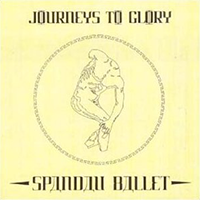| Journeys to Glory | ||||
|---|---|---|---|---|
 | ||||
| Studio album by | ||||
| Released | 6 March 1981 | |||
| Recorded | September 1980 – December 1980 | |||
| Studio |
| |||
| Genre | ||||
| Length | 36:37 | |||
| Label |
| |||
| Producer | Richard James Burgess | |||
| Spandau Ballet chronology | ||||
| ||||
| Singles from Journeys to Glory | ||||
| ||||
Journeys to Glory is the debut studio album by English synth-pop band Spandau Ballet, released on 6 March 1981 by Chrysalis Records. All of the songs on the album were produced by Richard James Burgess and written by band guitarist Gary Kemp to appeal to the patrons of a weekly Tuesday night club the band started attending called the Blitz, where they were accustomed to hearing "white European dance music". Their performances at the Blitz and other exclusive venues attracted the attention of record labels eager to sign them, and one of the songs they had been performing, "To Cut a Long Story Short", gained popularity through a recording session made at BBC Radio 1.
The high demand for their music instigated the commencement of recording the album and the release of "To Cut a Long Story Short" as their first single. The song reached number 5 on the UK Singles Chart, and two subsequent hits, "The Freeze" and "Muscle Bound", peaked at 17 and 10, respectively. A music video was made to promote each of the three songs, whose success warranted appearances on the British music chart television programme Top of the Pops. The album got as high as number 5 on the UK album chart and received Gold certification from the British Phonographic Industry for shipment of 100,000 units.
The influence of David Bowie on Journeys to Glory has been discussed by Kemp as well as critics of the album, who gave it mixed reviews upon its release and years later. After their composer attempted to shift to a more American style of funk with songs like "Glow" and the first single for their next album, "Chant No. 1 (I Don't Need This Pressure On)", he remembered that the songs from Journeys to Glory had been rehearsed at concerts before they were signed to a label and had received the approval of their original fan base. When some of the new songs for the second album did not chart as well, the band recovered by remixing a fourth single as a more pop-flavored tune and lost the interest of the hipsters that Spandau Ballet had initially courted with the songs that were recorded for their debut. Kemp then felt freed from trying to please that crowd and began writing mainstream pop songs that were the band's biggest hits.
- ^ Borthwick, Stuart; Moy, Rob (2004). Popular Music Genres: an Introduction. Edinburgh, Scotland: Edinburgh University Press. p. 137. ISBN 0-7486-1745-0.
- ^ a b Evans, Richard (6 August 2024). "1981.1". Listening to the Music the Machines Make: Inventing Electronic Pop 1978-1983. Omnibus Press. p. 242. ISBN 978-1-915841-45-2.